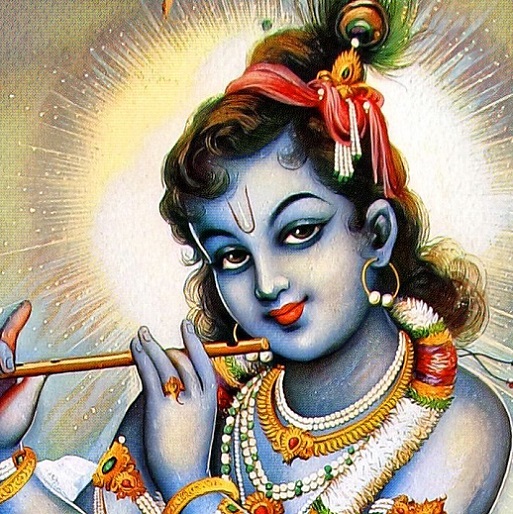(Bhagavan Shri Krishna)
"The body of Kṛṣṇa, the ocean of the eternal beauty of youth, can be seen to move in waves of beauty. There is a whirlwind at the sound of His flute, and those waves and that whirlwind make the hearts of the gopīs flutter like dry leaves on trees, and when those leaves fall down at Kṛṣṇa's lotus feet, they can never rise up again. There is no beauty to compare with Kṛṣṇa's, for no one possesses beauty greater than or equal to His. Since He is the origin of all incarnations, including the form of Nārāyaṇa, the goddess of fortune, who is a constant companion of Nārāyaṇa, gives up Nārāyaṇa's association and engages herself in penance in order to gain the association of Kṛṣṇa. Such is the greatness of the superexcellent beauty of Kṛṣṇa, the everlasting mine of all beauty. It is from that beauty that all beautiful things emanate.
The attitude of the gopīs is like a mirror upon which the reflection of Kṛṣṇa's beauty develops at every moment. Both Kṛṣṇa and the gopīs increase their transcendental beauty at every moment, and there is always transcendental competition between them. No one can appreciate the beauty of Kṛṣṇa by properly discharging his occupational duty, or by austerities, mystic yoga, cultivation of knowledge or by prayers. Only those who are on the transcendental platform of love of God, who out of love engage in devotional service, can appreciate the transcendental beauty of Kṛṣṇa. Such beauty is the essence of all opulences and is only appreciated in Goloka Vṛndāvana and nowhere else. In the form of Nārāyaṇa the beauties of mercy, fame, etc., are all established by Kṛṣṇa, but Kṛṣṇa's gentleness and magnanimity do not exist in Nārāyaṇa. They are found only in Kṛṣṇa.
Lord Caitanya, greatly relishing all the verses of Śrīmad-Bhāgavatam which He was explaining to Sanātana, quoted another verse (SB 9.24.65):
yasyānanaṁ makara-kuṇḍala-cāru-karṇa-
bhrājat-kapola-subhagaṁ savllāsa-hāsam
nityotsavaṁ na tatṛpur dṛśibhiḥ pibantyo
nāryo narāś ca muditāḥ kupitā nimeś ca
'The gopīs used to relish the beauty of Kṛṣṇa as a ceremony of perpetual enjoyment. They enjoyed the beautiful face of Kṛṣṇa, His beautiful ears with earrings, His broad forehead and His smile, and when enjoying this sight of Kṛṣṇa's beauty, they used to criticize the creator Brahmā for causing their vision of Kṛṣṇa to be momentarily impeded by the blinking of their eyelids.'
The Vedic hymn known as kāma-gāyatrī describes the face of Kṛṣṇa as the king of all moons. In metaphorical language, there are many different moons, but they are all one in Kṛṣṇa. There is the moon of His mouth, the moon of His cheeks, the moonspots of sandalwood pulp on His body, the moons of the fingertips of His hands and the moons of the tips of His toes. In this way there are twenty-four and a half moons, and Kṛṣṇa is the central figure of all of them.
The dancing movement of Kṛṣṇa's earrings, eyes and eyebrows is very attractive to the damsels of Vraja. Activities in devotional service increase the sense of devotional service. What else is there for two eyes to see beyond the face of Kṛṣṇa? Since one cannot adequately see Kṛṣṇa with only two eyes, one feels incapable and thus becomes bereaved. Such bereavement is slightly reduced when one criticizes the creative power of the creator. The unsatiated seer of Kṛṣṇa's face nonetheless laments: 'I do not have thousands of eyes, but only two, and these are disturbed by the movements of my eyelids. Therefore it is to be understood that the creator of this body is not very intelligent. He is not conversant in the art of ecstasy but is simply a prosaic creator. He does not know how to arrange things properly so one can see only Kṛṣṇa.'
The gopīs' minds are always engaged in relishing the sweetness of Kṛṣṇa's body. He is the ocean of beauty, and His beautiful face and smile and the luster of His body are all-attractive to the minds of the gopīs. In kṛṣṇa-karṇāmṛta, His face, smile and bodily luster have been described as sweet, sweeter and sweetest. A perfect devotee of Kṛṣṇa is overwhelmed by seeing the beauty of Kṛṣṇa's bodily luster, His face and smile, and he bathes in the ocean of transcendental convulsions. Before Kṛṣṇa's beauty, these convulsions often continue without treatment, just as ordinary convulsions which a physician will allow to continue, not even allowing a drink of water for relief.
The devotee increasingly feels the absence of Kṛṣṇa, for without Him one cannot drink the nectar of His beauty. When the transcendental sound of Kṛṣṇa's flute is heard, the devotee's anxiety to continue to hear that flute enables him to penetrate the covering of the material world and enter into the spiritual sky, where the transcendental sound of the flute enters into the ears of the followers of the gopīs. The sound of Kṛṣṇa's flute always resides within the ears of the gopīs and increases their ecstasy. When it is heard, no other sound can enter into their ears, and amongst their family they are not able to reply to questions properly, for all these beautiful sounds are vibrating in their ears."
(Teachings of Lord Caitanya, Chapter 10)
.
.
